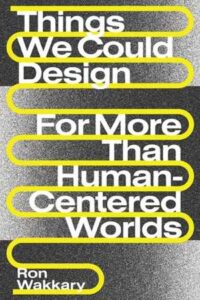نام کتاب: Things We Could Design – For More Than Human-Centered Worlds
نویسنده: Ron Wakkary
ویرایش: ۱
سال انتشار: ۲۰۲۱
کد ISBN کتاب: ۰۲۶۲۵۴۲۹۹۴, ۹۷۸۰۲۶۲۵۴۲۹۹۹,
فرمت: PDF
تعداد صفحه: ۳۱۲
حجم کتاب: ۱۴ مگابایت
کیفیت کتاب: OCR
انتشارات: The Mit Press
Description About Book Things We Could Design – For More Than Human-Centered Worlds From Amazon
How posthumanist design enables a world in which humans share center stage with nonhumans, with whom we are entangled.
Over the past forty years, designers have privileged human values such that human-centered design is seen as progressive. Yet because all that is not human has been depleted, made extinct, or put to human use, today’s design contributes to the existential threat of climate change and the ongoing extinctions of other species. In Things We Could Design, Ron Wakkary argues that human-centered design is not the answer to our problems but is itself part of the problem. Drawing on philosophy, design theory, and numerous design works, he shows the way to a relational and expansive design based on humility and cohabitation.
Wakkary says that design can no longer ignore its exploitation of nonhuman species and the materials we mine for and reduce to human use. Posthumanism, he argues, enables a rethinking of design that displaces the human at the center of thought and action. Weaving together posthumanist philosophies with design, he describes what he calls things–nonhumans made by designers–and calls for a commitment to design with more than human participation. Wakkary also focuses on design as “nomadic practices”–a multiplicity of intentionalities and situated knowledges that shows design to be expansive and pluralistic. He calls his overall approach “designing-with”: the practice of design in a world in which humans share center stage with nonhumans, and in which we are bound together materially, ethically, and existentially.
درباره کتاب Things We Could Design – For More Than Human-Centered Worlds ترجمه شده از گوگل
چگونه طراحی پساانسان گرایانه جهانی را قادر می سازد که در آن انسان ها در مرکز صحنه با غیرانسان ها که ما با آنها درگیر هستیم سهیم شوند.
در طول چهل سال گذشته، طراحان از ارزشهای انسانی ممتازی برخوردار بودهاند، به گونهای که طراحی انسانمحور بهعنوان مترقی تلقی میشود. با این حال، از آنجایی که هر چیزی که انسان نیست تحلیل رفته، منقرض شده یا مورد استفاده انسان قرار گرفته است، طراحی امروزی به تهدید وجودی تغییرات اقلیمی و انقراض مداوم گونههای دیگر کمک میکند. ران واکاری در کتاب چیزهایی که میتوانیم طراحی کنیم استدلال میکند که طراحی انسان محور پاسخی برای مشکلات ما نیست، بلکه خود بخشی از مشکل است. او با تکیه بر فلسفه، تئوری طراحی و آثار متعدد طراحی، راه را برای طراحی رابطه ای و گسترده بر اساس فروتنی و همزیستی نشان می دهد.
Wakkary میگوید که طراحی دیگر نمیتواند بهرهبرداری از گونههای غیرانسانی و موادی را که ما برای آنها استخراج میکنیم نادیده بگیرد و آنها را برای استفاده انسان کاهش دهد. او استدلال می کند که پساانسانیسم امکان بازاندیشی در طراحی را فراهم می کند که انسان را در مرکز اندیشه و عمل قرار می دهد. او که فلسفههای پساانسانگرایانه را با طراحی در هم میپیوندد، چیزهایی را توصیف میکند که او چیزهایی مینامد – غیرانسانهایی که توسط طراحان ساخته شدهاند – و خواستار تعهد به طراحی با مشارکت بیشتر از انسان است. Wakkary همچنین بر طراحی به عنوان “عملکردهای عشایری” تمرکز می کند – تعدد اهداف و دانش های موجود که طراحی را گسترده و کثرت گرایانه نشان می دهد. او رویکرد کلی خود را «طراحی با» مینامد: تمرین طراحی در دنیایی که در آن انسانها در مرکز با غیرانسانها سهیم هستند و در آن ما از لحاظ مادی، اخلاقی و وجودی با هم پیوند خوردهایم.
[box type=”info”]![]() جهت دسترسی به توضیحات این کتاب در Amazon اینجا کلیک کنید.
جهت دسترسی به توضیحات این کتاب در Amazon اینجا کلیک کنید.![]() در صورت خراب بودن لینک کتاب، در قسمت نظرات همین مطلب گزارش دهید.
در صورت خراب بودن لینک کتاب، در قسمت نظرات همین مطلب گزارش دهید.

